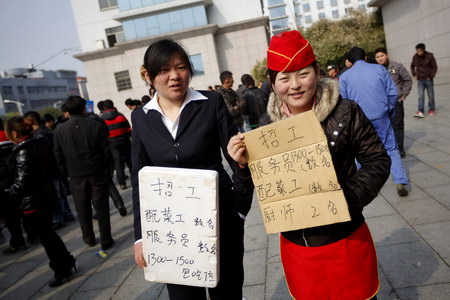Economy
Small firms struggle with labor shortage
Updated: 2011-08-08 09:52
(Xinhua)
Want of higher pay
|
 Recruiters hold up job advertisements looking for restaurant service staff and cooks at a job market in Yiwu.[Photo/Agencies]
|
Som analysts deny there is a "labor famine" in China, pointing to high inflation as the major culprit for the apparent shortage.
The increase in China's consumer prices accelerated to a three-year high of 6.4 percent in June, as a result of soaring food and property prices, according to the National Bureau of Statistics.
The situation is caused by job seekers' high salary expectations and firms hit with soaring labor and raw material costs, as well as the rising renminbi and lackluster market, economists say.
"I'm still looking for a job, not because there are no opportunities. Salary is the problem," said 32-year-old Fang Houliang from southwestern Chongqing Municipality while at a job fair in Liushi Township.
With a salary of about 2,000 yuan per month, Fang was hunting for a higher-paid job.
"Of the 2,000 yuan, 300 yuan goes to rent and electricity fees, 1,200 yuan for feeding a family of three, and then there's the cost of cigarettes and phone calls, little is left to save," Fang said.
"The pay should be at least 3,000 yuan a month, considering the price hikes of daily necessities," he said.
Other job hunters have made similar comments at job fairs in Wenzhou, Yiwu and other cities in Zhejiang. Many job hunters told Xinhua they had been waiting for the right jobs for up to two months.
Wang Fuman, a migrant worker from southwestern Guizhou Province, said, "We are paid by the number of products we make, so we clearly know the costs and profits, and we deserve higher pay."
"The problem is pay," said Ni Mengxuan, general manger of Zhejiang Nanfang Gift Company.
"Five years ago, migrant workers needed "guanxi" (recommendations by relatives or friends) to get recruited." However, an average income of 2,500 yuan per month now is unable to attract enough workers.
The person in charge of a precise hardware factory located in Dongguan City of southern Guangdong Province, who preferred to remain anonymous, said that he had kept raising salaries over the past two years to maintain sound operations.
"For an output of every 1 million yuan, we used to spend 80,000 yuan on labor. The figure has now jumped to 120,000 yuan. But a 50-percent climb would be unbearable."
Many small businesses are currently suffering as the edge they had in terms of low labor costs when competing with overseas manufacturers, has mostly gone.
Zhuo Yongliang, director of the Development and Reform Research Institute of Zhejiang, said that it would be a long process for small enterprises to transform themselves from low-end producers to high-end ones, who have difficulties in raising salaries to hire workers, let alone investing in high technologies and innovation to upgrade their production.
"It's inevitable that a number of small enterprises will be eliminated. But we shouldn't ignore the unemployment problem," said Zhuo, who called for the authorities to help avoid a wave of bankruptcies of small firms.

Specials

Beer we go
Early numbers not so robust for Beijing's first international beer festival

Lifting the veil
Beijing's Palace Museum, also known as the Forbidden City, is steeped in history, dreams and tears, which are perfectly reflected in design.

Allure of mystery
China continues to be a place of fascination for traveling artists from around the world.